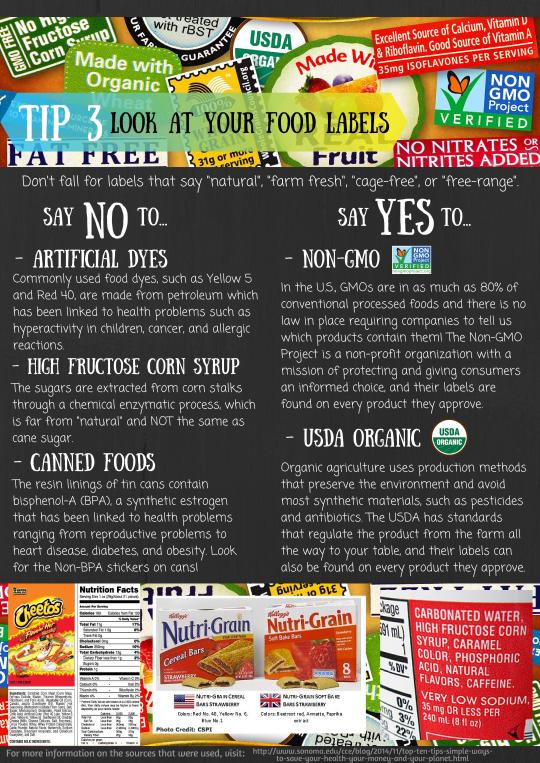Simple Ways to Save Your Health, Money, and Planet: Tip 3
Unfortunately in America, thousands of fillers, chemicals, and ingredients that are associated with major health problems are still used by our food industry. Companies use these cheap alternatives to reap larger profits from their products, but as a result they put the health and well-being of their consumers second to cost efficiency. Just by looking at labels and the list of ingredients on the back of products, you can take better control of the additives and chemicals that enter your body. Stand by companies that care as much about your health and the health of our environment as they do about your money.

- Don't fall for labels that say "natural", "farm fresh", "cage-free", or "free-range": Companies know that this vocabulary is desirable by customers, but they hide behind language to sell their products rather than actually changing their policies and practices
- Say NO to...
○Artificial Dyes: Commonly used food dyes, such as Yellow 5 and Red 40, are made from petroleum which has been linked to health problems such as hyperactivity in children, cancer, and allergic reactions.
○High Fructose Corn Syrup: The sugars are extracted from corn stalks through a chemical enzymatic process, which is far from "natural" and NOT the same as cane sugar.
○Canned Foods: The resin linings of tin cans contain bisphenol-A (BPA), a synthetic estrogen that has been linked to health problems ranging from reproductive problems to heart disease, diabetes, and obesity. Look for the Non-BPA stickers on cans!
- Say YES to...
○Non-GMO: In the U.S, GMOs are in as much as 80% of conventional processed foods and there is no law in place requiring companies to tell us which products contain them! The Non-GMO Project is a non-profit organization with a mission of protecting and giving consumers an informed choice, and their labels are found on every product they approve.
○USDA Organic: Organic agriculture uses production methods that preserve the environment and avoid most synthetic materials, such as pesticides and antibiotics. The USDA has standards that regulate the product from the farm all the way to your table, and their labels can also be found on every product they approve.
Similar to the first tip of 'Be a Smart Consumer', where and how you choose to spend your money can make all the difference in the pressure companies face to change their ingredients and practices. Next time you are at the grocery store take a look at the language, labels, and ingredients used in the food you buy. Take the first step in gaining back control of your body, your money, and your health.

Author: Claudia Sisomphou

